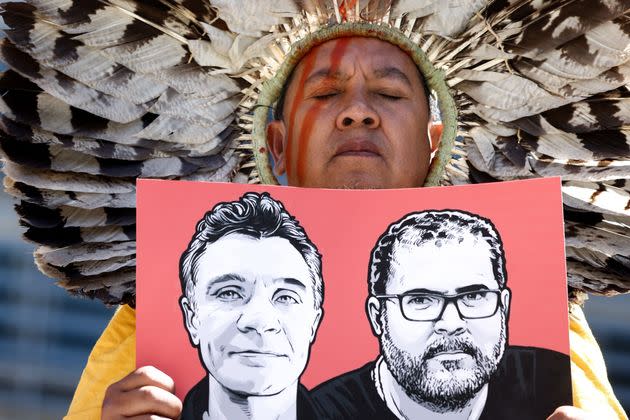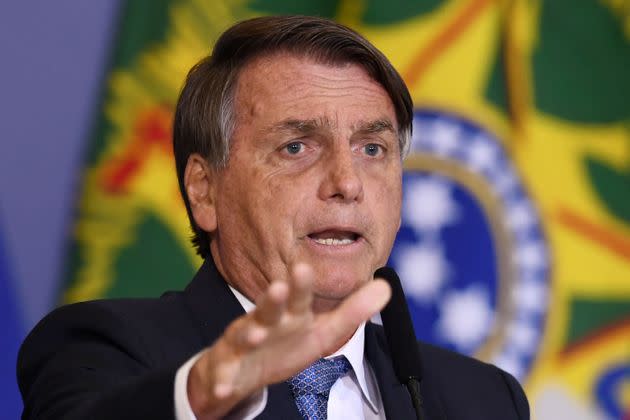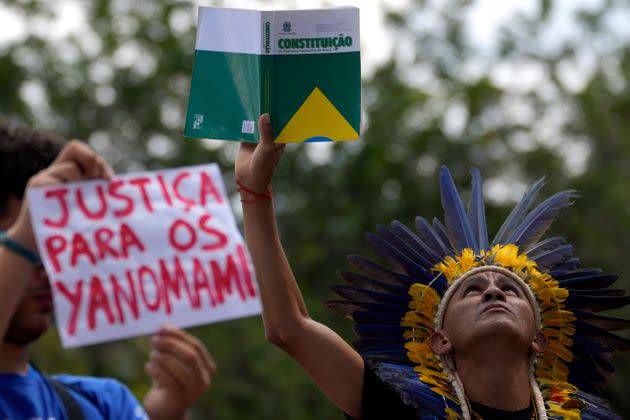Dom Phillips And Bruno Pereira's Deaths Were An Inevitable Tragedy In Bolsonaro’s Brazil
- Oops!Something went wrong.Please try again later.

A member of the Articulation of Indigenous Peoples of Brazil (APIB) holds the image of missing British journalist Dom Phillips and Brazilian Indigenous affairs specialist Bruno Pereira during a protest in Europe. Brazil's police confirmed Wednesday that someone had confessed to killing the two men in a remote region of the Amazon rainforest. (Photo: KENZO TRIBOUILLARD via Getty Images)
SÃO PAULO ― Brazil’s right-wing president, Jair Bolsonaro, has waged a furious campaign against the country’s Indigenous population since he was elected in 2018, targeting tribal people and lands with a relentless array of verbal assaults, legislative proposals, efforts to gut environmental agencies and the outright elimination of laws and regulations to protect them.
In August 2021, a coalition of Brazilian Indigenous groups produced a dossier of the attacks that had occurred during the first two years of Bolsonaro’s presidency in order to detail the “broad and comprehensive anti-Indigenous project” he and his right-wing allies had implemented.
The problem went beyond Bolsonaro’s legal attacks on Indigenous rights. The “hate speech” Bolsonaro directed toward them and his characterization of the Indigenous as “enemies” of Brazil, the authors wrote in the report’s introduction, had also inspired others to attack and even kill Indigenous Brazilians, especially in conflicts over territory in the Amazon rainforest and other environmentally sensitive regions.
“When the example of the country’s highest authority is one of contempt for laws and hatred of humanity,” they asked, “what can be expected from those who are inspired by such an abominable figure?”
The world found out this month, when Dom Phillips, a British journalist, and Bruno Araujo Pereira, a Brazilian Indigenous affairs expert, disappeared during a trip to the Vale do Javari, a remote region of the Amazon rainforest in far western Brazil. On Wednesday, Brazilian police found human remains near the site where they had gone missing on June 5 and confirmed that a suspect had confessed to participating in their murder.
Phillips and Pereira were, individually and especially as partners, the antithesis of Bolsonaro’s anti-Indigenous project. Phillips was a veteran reporter who had written about the environment and Brazil’s Indigenous tribes for years. He was in the Vale do Javari to complete his reporting for a book about sustainable development of the Amazon, an idea that runs against Bolsonaro’s belief that the forest must be bulldozed to promote economic development.
Pereira, a career employee of Brazil’s top Indigenous affairs agency who had helped tribes within the Javari Valley utilize technology to monitor and protect their lands, was “a dedicated defender” of the forest and the Indigenous people Bolsonaro and the Brazilian government now target for destruction.
He and his government bear responsibility. They have created the conditions for this.Fiona Watson, Survival International
Remote regions of the Amazon rainforest are and have long been dangerous places: Activists like Chico Mendes and Dorothy Stang were killed inside the forest long before Phillips and Pereira disappeared. But that hardly excuses Bolsonaro’s callous response to the tragedy: In his initial statement two days after they first went missing, Bolsonaro suggested the pair’s disappearance was the result of an ill-conceived “adventure.” This week, he all but blamed Phillips for angering illicit forces in the forest and failing to protect himself.
That response, or any other that paints their deaths as an inevitable fact of life in a lawless region of the world, ignores both how much more dangerous Brazil has become under Bolsonaro’s leadership and whom it has become most dangerous for.
Bolsonaro did not kill Phillips and Pereira. But a tragedy of this sort was inevitable in his Brazil ― a Brazil in which Bolsonaro’s erosion of the state has created a massive void where governmental protections for human rights defenders, journalists, the Indigenous and anyone else opposed to illicit activity in places like the Vale do Javari used to be.
“It’s a government that has no respect for Indigenous people or the rule of law,” said Fiona Watson, the research and advocacy director for Survival International, a global Indigenous rights group that works closely with Brazilian tribes and organizations. “He and his government bear responsibility, in my view. They have created the conditions for this.”
Since taking office in 2019, Bolsonaro has inspired and effectively encouraged the total destruction of both the Amazon rainforest and the Indigenous tribes who live within it. He has rolled back protections for Indigenous lands and gutted the country’s environmental enforcement and tribal affairs agencies. His allies in Brazil’s Congress have pushed laws to open Indigenous lands to mining and further curb other protections. Bolsonaro’s government issued a record low number of fines related to environmental crimes during his first two years in office; government agencies like FUNAI, which oversees Indigenous affairs, and IBAMA, Brazil’s main environmental enforcement body, have been transformed from protective forces into tools of Bolsonaro’s destruction.
Bolsonaro has given the green light to illegal miners, fishers, loggers and other illicit actors to treat the forests, like the Amazon and Brazil’s Indigenous lands, as their own and helped create a culture of impunity for those who have targeted the forest and its tribal people. In 2020, long before Phillips and Pereira went missing, Human Rights Watch alleged that he had given “carte blanche” to criminally destructive forces in the Amazon region.
That has “undoubtedly contributed to this feeling of impunity in people who think they can just go into Indigenous territories and do what they like, ransack them and steal their natural resources,” said Watson, who has worked alongside Brazilian tribes inside the Amazon and other regions.

Brazilian President Jair Bolsonaro has presided over record destruction of the Amazon rainforest and sharp increases in the number of murders of Indigenous people, both of which have taken place as he has gutted protections for the forest and protected Indigenous lands. (Photo: EVARISTO SA via Getty Images)
Indigenous people, she said, have told her that land invaders have delivered a pointed message when confronted on tribal lands: “The invaders said, ‘We can do what we like, because we have Bolsonaro behind us,’” Watson said. ”FUNAI is not operating. It’s not doing its job. It has left the people of the Javari Valley to the mercy of the mining gangs and the poaching gangs. There’s a complete abdication now of state responsibility.”
Phillips and Pereira are hardly the first to disappear or die while attempting to document the destruction that has taken place: In 2019, Maxciel Pereira dos Santos, who like Pereira worked for FUNAI, was assassinated in the Vale do Javari. Local journalists have been harassed, threatened and even killed in the area and others like it within the Amazon region.
Invasions of Indigenous lands skyrocketed early in Bolsonaro’s tenure as miners, loggers, fishers and others raced to kickstart illegal and exploitative operations throughout the forest ― often in protected tribal territories. Now barelya monthpasseswithout a deadly attack on Indigenous tribes or environmental activists, as Smoke Signal, an effort to monitor the country’s environmental and human rights crises, has documented.
Just two months before Pereira and Phillips disappeared, tribes within the Vale do Javari reported that armed invaders had entered their territories, and they warned Brazil’s authorities that teams of fishers and hunters had been present for weeks. After a conflict with one of the groups, Univaja, a coalition of tribes from the Javari Valley, requested assistance from regional FUNAI officials. But none came, according to documents obtained by UOL, a Brazilian news outlet.
“We’ve been sending information about the invasion of the Javari Valley to the authorities, telling them that armed gangs of poachers linked to drug traffickers are in our territory to take our resources,” Univaja leaders said in a statement Wednesday night. “But the authorities have been slow to react.”
Two weeks before Pereira and Phillips went missing, an 18-year-old member of the Guarani Kaiowá tribe was murdered in Mato Grosso do Sul, a state south of the Amazon region where Indigenous lands have also come under attack. Farmers had previously overtaken a tribal territory in the state, which borders Paraguay, to establish a soy farm.
Overall, nearly 300 Indigenous people were murdered in the first two years of Bolsonaro’s presidency, a steep increase from the years prior, according to Brazil’s Indigenous Missionary Council. In most instances, including some of the highest-profile killings, authorities have barely investigated the crimes, much less held anyone accountable.
Bolsonaro’s government has retaliated against employees like Pereira who have sought to protect Indigenous tribes. In 2019, Pereira was removed from his post at FUNAI, where he oversaw the agency’s efforts to protect isolated tribes that have no known contact with the outside world, a move many Indigenous allies interpreted as a political purge of a well-respected ally who opposed Bolsonaro’s promises to co-opt the agency. Two years later, the government opened an investigation into prominent Indigenous leaders who criticized its efforts to protect tribes from COVID-19.

Brazilian Indigenous tribes have staged mass protests against Bolsonaro's government and proposals to further open lands to miners, loggers and fishers. They have alleged that he is waging a genocidal campaign against them and accused him of crimes against humanity. (Photo: Eraldo Peres/Associated Press)
None of this is a secret, in Brazil or to the world: In January 2021, Brazilian Indigenous leaders alleged that Bolsonaro had committed crimes against humanity in a lawsuit filed in the International Criminal Court, asserting that his policies amounted to a genocidal campaign against the country’s tribal people.
Brazil’s Indigenous tribes have staged protests in cities from Brasília and São Paulo to New York, Washington and London. They have spoken at United Nations-sponsored climate events, met with members of the U.S. Congress and partnered with American Indian tribes to raise awareness in the United States. They have asked the United Kingdom to suspend trade talks with Bolsonaro and warned President Joe Biden not to trust his Brazilian counterpart in negotiations over new environmental protections and climate goals.
Their fight, they’ve argued, is part of a broader battle to save the Amazon and combat climate change that cannot be won without them. Attacks on their rights, they’ve told the world, are inseparable from a larger assault on democracy ― in Brazil and beyond.
They have spent the last three years begging for help only to see two more men killed trying to provide it. Now they are demanding that global attention remain on Brazil. The same Indigenous tribes that criticized the Brazilian government’s “absence” from the initial search for Phillips and Pereira, and launched their own efforts to find the missing pair, are now holding protests to insist that the government bring their killers to justice.
Perhaps in this instance they will get it. It’s possible ― maybe even likely ― that the domestic outrage and international pressure around this case will leave Brazil’s police and its government little choice but to seek the sort of accountability that has become a rarity under Bolsonaro.
But that won’t be enough: Bolsonaro’s allies in Brazil’s Congress are still pushing new laws to open Indigenous lands to mining, and Bolsonaro’s government is still targeting Indigenous people and their defenders at every opportunity. Without more international support and attention, the country’s tribes are keenly aware of what will happen when interest in Phillips and Pereira’s deaths inevitably passes.
“When the Armed Forces and press leave Atalaia do Norte, what will happen with us?” Univaja asked in its Wednesday night statement, referring to the Amazonian city to which Phillips and Pereira were supposed to return. “Will we continue living under threats?”
The answer to that question seems unfortunately obvious. Bolsonaro’s Brazil is one that is more dangerous ― and increasingly deadly ― for the Indigenous, for defenders of human rights and the environment, for government workers like Pereira and journalists like Phillips. Bolsonaro’s Brazil is exactly the place now that Indigenous Brazilians and many others warned it would be before he was elected. There may be some justice to come for Pereira and Phillips, but there will almost assuredly be more victims of senseless crimes like those committed against them.
Because in Bolsonaro’s Brazil, their deaths were no accident. They were a tragic result of his presidency.
This article originally appeared on HuffPost and has been updated.
Related...
'Human Remnants' Found In Search For Dom Phillips And Bruno Pereira, Brazil Minister Says
The Amazon Rainforest Can’t Survive 4 More Years Of Brazil's Far-Right President
Brazilian Government ‘Absent’ From Search For Missing Journalist, Indigenous Groups Say
British Journalist, Indigenous Expert Have Gone Missing In The Amazon

